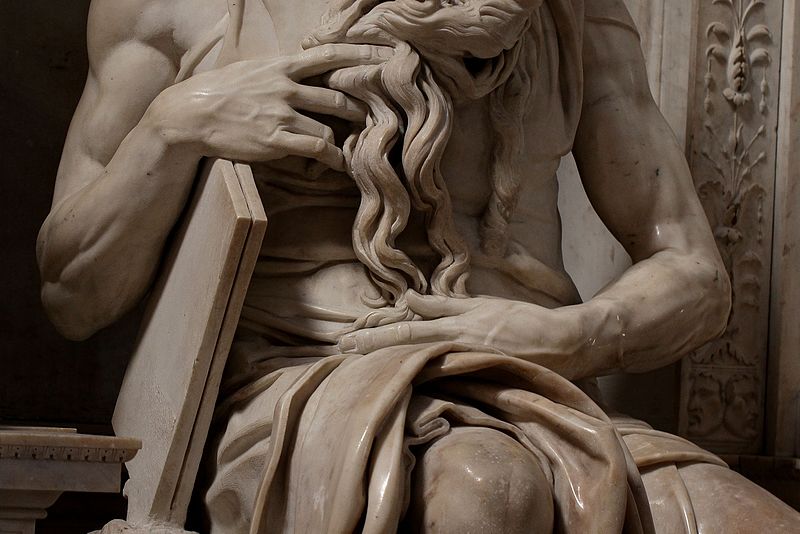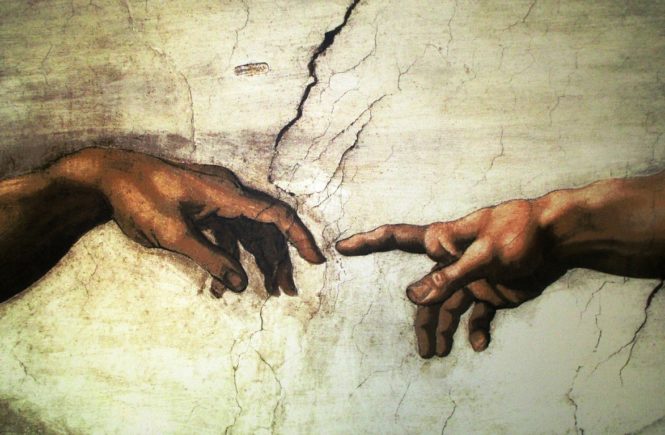Podcast: Play in new window | Download
For the last few Sundays we’ve been hearing the Sermon on the Mount. It starts in a very encouraging way, especially for the oppressed and the suffering: Blessed are the poor in spirit, blessed are the hungry, blessed are the thirsty… Then last week we heard an even more encouraging message when Jesus says to his followers, “You are the salt of the earth,” and “You are the light of the world” (Mt 5:13-14). But as the sermon continues, things start to get a little more difficult. Today Christ challenges his listeners to interiorize the Law. “Unless your righteousness,” he says, “surpasses that of the scribes and the Pharisees, you will not enter into the kingdom of heaven” (Mt 5:20). As if to say that if we don’t go beyond compliance, beyond external satisfaction of the law, then we cannot be saved. There was cartoon strip where Moses is walking down from the Mount with the Law in his hands. He says to the people “Guys, I have good news and bad news. The good new is I brought Him down to just ten Commandments. The bad news is… adultery is still one of them!” This negotiation symbolizes the struggle we tend to have between external compliance with the Law and what we really believe at heart. In today’s message, Jesus challenges that discrepancy.
You have heard it said…, well now I say to you…
You have heard ‘Do not kill’ but I tell you that anybody who fosters anger in their heart is already killing.
You have heard ‘Do not commit adultery’ but anybody who looks lustfully has already committed adultery.
You have heard ‘Do not take a false oath’ but I say to you swearing is already doing so.
If we look at the Sermon on the Mount in isolation, on its own, it would seem to be bad news. Who can measure up to these challenges? Imagine if our present system of law. would evaluate not only our words and actions but also our thoughts and desires, and judge us accordingly? Who could measure up? Seen on it’s own, the Sermon of the Mount looks like an insurmountable challenge. But, if we look at who this “New Law-Giver” is and what this “New Law” means then we will find a new perspective. As the first reading says, “If you choose, you can keep the commandments…Set before you are fire and water; to whatever you choose, stretch out your hand. Before everyone are life and death, whichever they choose will be given them” (Ben Sira 15:15-1). We can choose. God has given us free will. He has given us the capacity to choose: Fire and water, Life and Death, Good and evil. The thing is, only free creatures can choose to love. God cannot force us to love Him. St Augustine says it well, “God who created you without you, will not save you without you.” It is only through our exercise of the will, not despite it, that salvation can take place.
I remember visiting a woman in my previous parish who was homebound and had requested confession. I knocked on the door and her son opened it. “Who are you?” he asked. “I’m father Jorge,” I said, “I’m here to give your mother the sacraments.” He looked at me, “One second” he said, and closed the door. I could hear them talking. His mother came to the door and said, “Father, thanks for coming, but my son is right. I am a temple of the Spirit; Jesus already loves me. I don’t need to go to Mass or confession or any of those things. Thank you.” The first thing that came to my mind in this moment was exactly this section of the Sermon on the Mount, when Jesus says he “did not come to abolish the law”, as if to say, Everything you heard before is wrong! You don’t have to do that. Just love Jesus. This abolitionist view of Revelation seems to be exactly what Jesus warns us against.
Christ reminds us of our capacity to choose: to accept or reject; to choose not to decide is already choosing. Jesus reminds us that we can choose to adore God as a community, or not. We can choose to allow sin to hold onto our hearts, or to let it go. We can choose forgiveness. God gave us freedom because He wants us, He needs us, to exercise that freedom. We have to be very careful of using this freedom in a self-indulgent way in order to justify our own behavior rather than to find the presence of God in our lives.
Jesus did not come to abolish the Law. We choose. We choose to live according to Christ, or according to our own will. Judicial law, the laws of countries, only regulates external behaviors, so that large populations of people can get along. But divine law, the law of Christ, is committed that we become Christ-like in every way. Christ calls for us to evaluate our thoughts and desires, and to choose accordingly. We might ask: Why does God dictate what I should think, feel and desire if I don’t hurt anybody? A young man walks into a luxurious sports car dealership. He starts looking at all the beautiful cars on show and finally he finds one that he wants. It’s a Lamborghini Murcielago, black, beautiful, aerodynamic, and the doors swivel vertically. He says “This is the one I want.” He test drives it and decides to buy it. The salesman sits him down and says, “Well son, you should know that these luxurious cars require very special care. They can only take super premium gasoline and ultra premium oil that needs to be changed frequently.” The young man looks at the salesman and he says “You know what, that’s not going to work for me.” “Why do you say that?” asks the salesman, surprised. “Well, gasoline is just too pungent for me. I think I’m going to use champagne instead. I like the bubbly sweetness. And oil? No, I think the color and texture of strawberry jam goes more with my type, so I’ll use that.”
Sometimes we too act in this way. We could think, You know God, this aspect of the Law, that’s just a little too hard to swallow. I’m going to choose to do it this way. And I’m sure you’d be OK because you love me. Or, You know Jesus, these sayings about Heaven and Hell and divorce and being careful of our thoughts and our desires, that’s just too much. I’m going to choose to go this other way.
We fail to realize that the Law of God, Divine Law, is really a User’s Manual that guides and teaches us to manage this incredible car that we have. This being that has been given to us, capable of greatness— endowed with a body, a mind, a heart, a spirit, with dreams and passions —is gifted with tremendous power. And so, our User’s Manual shows us how to fill our life, our human nature, with its deepest purpose: Jesus Christ.
It all comes down to choice, to the exercise of the free will that God has given us. Paul says that “Love is the fulfillment of the law,” (Rm 13:10). So, I can choose not to gossip, not because the Law limits me, but because I choose to love myself, my Heavenly Father and my community. I can choose not to see these provocative images or thoughts, not because the Law says I shouldn’t but because I choose to love myself, my Heavenly Father and my community. I can choose to let go of sin. I can choose to forgive. I can choose all these things not because the law constrains me, but because Christ has won for me this freedom: Love is the fulfillment on the Law. Today’s Second Reading says it magnificently, “What eye has not seen, and ear has not heard, and what has not entered the human heart, what God has prepared for those who love him” (1 Cor 2:9).
Let us ask Mary to show us how to choose with courage. May she show us how to orient ourselves towards what is true and lawful, towards what is love-full. May she show us how to choose Life, how to choose Good, how to choose our Christ.
This post is also available in: Spanish






